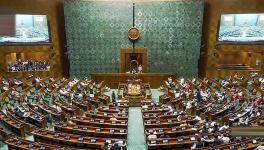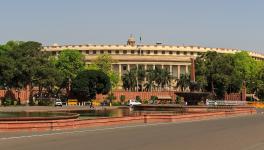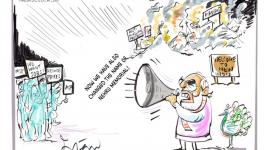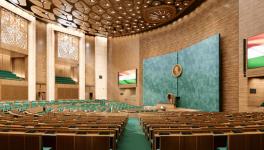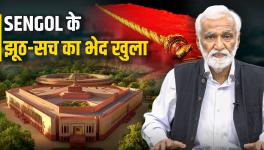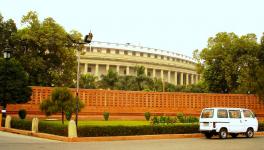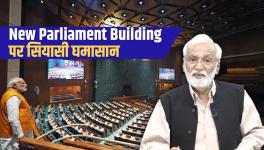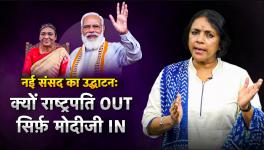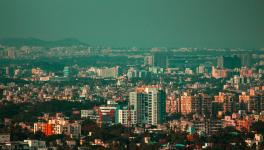On this R-Day, India also Commemorates Victory of Delusion over Memory
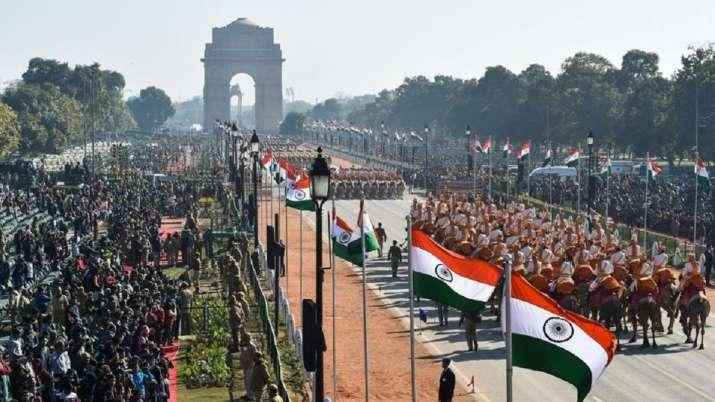
Image Courtesy: PTI
The visual memory tricks depicted in the Malayalam movie Drishyam (now also in Hindi) characterise the words of English writer DH Lawrence, who once said, “What an eye doesn’t see and the mind doesn’t know, doesn’t exist.” The lead character in the film goes around talking to people, reminding them of interactions that never took place. People are pleased by his demeanour and do not suspect he is implanting false memories that later support his defence before the police and courts. We in India are subject to a similar plot at present. Unfortunately, citizens are in the place of the police and judiciary, misguided by the deceptions of the lead actor. Once again, the educated middle class who steered nationalist sentiments during the Indian national movement is being targeted to replace the original idea of India with the Hindu nation-building project.
While symbols and reminiscences of our inherited memory are systematically obliterated, and we are presented with new symbols of remembrance, the entire process is being projected as “returning to our glorious past”. We built a grand civilisation with an amalgam of traditions harking to an ancient past. Continuing with this tradition, in the 75 post-independence years, we have created a fair and courageous nation laid on the foundation of stamina jayate [long live stamina!]. We have not built our personalities or identities on falsehoods. We acknowledged and faced our past, learned from it and commemorated our victories. Since we learn from past mistakes, we do not magnify communal hatred, apartheid, and mass murders. So, we would never want to commemorate the killings in the Mahabharata, the anti-Sikh riots, or the post-Godhra riots! We would never want to commemorate the horrendous life and death battles we waged due to a negligent government during the ongoing pandemic. Right? Why, then, did the present government institute the Partition Horrors Remembrance Day last year?
We can find the answer in the BJP’s agenda to plot a consciousness of fear and hatred. Commemorating a “day of horror” communicates that the “enemies” who gave us the pain of Partition should be taught a lesson. It was done to create and magnify differences and foster discontinuity. It also strives to establish that we are better than those projected as ‘others’. Such a comparison is fuelled by the idea that we were historically exploited and, therefore, must reclaim our country. Whatever is required to create this psyche is being built, instituted, and commemorated. What contradicts this narrative is bulldozed. These memory tricks are working well on many vulnerable minds.
The Central Vista project is one of several destructive acts that have ruthlessly snatched the memories of our nation and paved the way to paint India as a Hindu nation. This project ensures a name for the BJP in nation-building to compensate for its absence in the freedom movement and following decades. With the same motive, the bhoomi-poojan ceremony for the Central Vista Avenue, was held in February 2021 by Union Minister Hardeep Singh Puri, a Sikh. It was a clear attempt to communicate that the Hindu nation would accept those minorities who accept subordination to the Hindus.
The recent extinguishing or “merging” of Amar Jawan Jyoti is part of this plot. The Amar Jawan Jyoti was inaugurated on 26 January 1972 to honour the soldiers martyred in the Indian military victory over Pakistan in December 1971. Since then, the flame at Amar Jawan Jyoti was never extinguished and remained the point of reverence for the Indian armed forces. Placing the War Memorial against the India Gate was a brave Indian assertion to stand in the face of history and profess its sovereignty to those who ruled us in the past. It reassured us of a substantial and long past that whispers, “we survived it all”, without washing over the truth. Republic Day, which celebrates this victory, did not choose to obliterate or bulldoze the history of the colonial past or make a separate war memorial.
A new National War Memorial was erected in the heart of the city to instil the notion that the previous structure was a colonial legacy. Then the flame at Amar Jawan Jyoti was extinguished on 21 January. Our Prime Minister was not seen honouring the process of paying tribute to the “merged” flame. Once again, we understood that the prime minister of a democratic and secular country deems it essential to attend and perform the bhoomi-poojan ceremony of Ramjanmabhoomi but does not attend the “flame extinguishing/merging” ceremony of the revered Indian soldiers who died for this land. Further, in utter disrespect, the National War Memorial omitted the names of those soldiers who fought for the British in World War-I and the Anglo-Afgan wars but are hosted at India Gate. Going by this logic, we should disown our grandparents and great grant parents if they earned their livelihood from the British or the East India Company.
To silence questions on these moves, a statue of Netaji Subhas Chandra Bose, who gave a tough fight to the imperial forces, was placed under a canopy left empty ever since the statue of King George V was removed. Earlier, a statue of Mahatma Gandhi was not placed instead of George V, based on the understanding that the imperial structure, including the canopy, would belittle his stature. If then imperial structures were the reason for shifting the commemorative sanctums, why did not Netaji’s statue receive the same honour and find a place elsewhere?
In still more meddling with national consciousness, the government decided to remove “Abide with Me” from The Beating of the Retreat ceremony held on 29 January every year. This hymn solicits the presence of a god beyond religious and national boundaries to help soldiers live up to their arduous duties. Gandhi believed in international brotherhood, and this was his favourite hymn that signals spiritual solace and comfort to a lonely soldier, something along the lines of what the Bhagwat Gita provides. But since a hymn that establishes commonness and continuity with different traditions threatens the Hindu national identity, it had to be dropped from a national celebration.
This process is how we selectively remove symbols and memories that do not align with the Hindu nationalist narrative. It supports false narratives that a host of new ceremonial and commemorative structures, such as the Central Vista, are being created.
Even more perturbing is that if these narratives are evidently fabricated, why is the educated middle-class buying into them? Those who celebrate the monolithic idea of India are falling for the tricks that the main lead in Drishyam deployed. The constructive nature of human memory provides a fertile bed for such cultivations. Besides, humans have a psychological need to seek and connect with real or imagined roots and think of themselves as superior to “others”. The educated middle class views this New India as a distinct identity based on a systematic accentuation of differences between Hindus and non-Hindus. Therefore, they are tempted to buy all the fabricated narratives about reclaiming the past and justify its destructions.
Nations and individuals look up to history for their sense of a larger identity. Therefore, they deserve to receive history in the most unadulterated and unabridged form possible. But here is a nation being created based on destroying all truths. Earlier, we generated this identity from having sustained through history over time, but now entire epochs are being replaced by grand structures and professing militarism. This leads to an extremely delusional consciousness, where we are made to deny actual historical episodes and demolish reminiscences of the past. Yet when you delete the past, even if it is undesirable to you, there are bound to be consequences. You will be bewildered, restless and directionless—both as an individual and a nation.
The author is an Assistant Professor at the National Institute of Advanced Studies, Indian Institute of Science Campus, Bengaluru. The views are personal.
Get the latest reports & analysis with people's perspective on Protests, movements & deep analytical videos, discussions of the current affairs in your Telegram app. Subscribe to NewsClick's Telegram channel & get Real-Time updates on stories, as they get published on our website.









